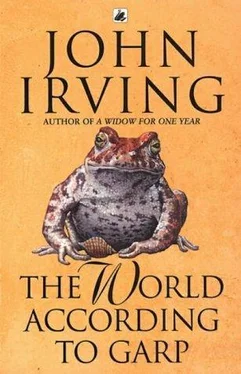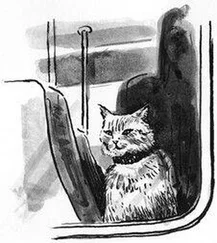“Well, I'll be,” the policeman said, but something was still bothering him; Garp could tell something was wrong.
“I had a beard then,” Garp offered.
“That's it!” the policeman cried. “And you've shaved it or”
“Right,” said Garp.
The policemen had a conference in the red glow of the taillights of the squad car. They decided to give Garp and Duncan a ride home, but they said Garp would still have to show them some information regarding his identity.
“I just don't recognize you—from the pictures—without the beard,” the older policeman said.
“Well, it was years ago,” Garp said, sadly, “and in another town.”
Garp felt uneasy that the young man in the caftan would get to see the house the Garps lived in. Garp imagined the young man would show up one day, asking for something.
“You remember me?” the kid asked Duncan.
“I don't think so,” Duncan said, politely.
“Well, you were almost asleep,” the boy admitted. To Garp he said, “You're too uptight about children, man. Children make it just fine. This your only child?”
“No, I have another one,” Garp said.
“Man, you ought to have a dozen other ones,” the boy said. “Then maybe you wouldn't get so uptight about just one, you know?” This sounded to Garp like what his mother called the Percy Theory of Children.
“Take your next left,” Garp told the policeman who was driving, “then a right, and it's on the corner.” The other policeman handed Duncan a lollipop.
“Thank you,” Duncan said.
“What about me?” the kid in the caftan asked. “ I like lollipops.” The policeman glared; when he turned his back, Duncan gave the kid his lollipop. Duncan was no fan of lollipops, he never had been.
“Thank you,” the boy whispered. “You see, man?” he said to Garp. “Kids are just beautiful.”
So is Helen, Garp tbought—in the doorway with the light behind her. Her blue, floor-length robe had a high, roll-up collar; Helen had the collar turned up as if she were cold. She also had her glasses on, so that Garp knew she'd been watching for them.
“Man,” whispered the kid in the caftan, elbowing Garp as he got out of the car. “What's that lovely lady like when she gets her glasses off?”
“Mom! We got arrested,” Duncan called to Helen. The squad car waited at the curb for Garp to get his identification.
“We did not get arrested,” Garp said. “We got a ride , Duncan. Everything's fine ,” he said angrily, to Helen. He ran upstairs to find his wallet among his clothes.
“Is that how you went out?” Helen called after him. “Dressed like that?”
“The police thought he was kidnapping me,” Duncan said.
“Did they come to the house?” Helen asked him.
“No, Dad was carrying me home,” Duncan said. “Boy, is Dad weird.”
Garp thundered down the stairs and ran out the door. “A case of mistaken identity,” Garp muttered to Helen. “They must have been looking for someone else. For God's sake, don't get upset.”
“I'm not upset,” Helen said, sharply.
Garp showed the police his identification.
“Well, I'll be,” the older policeman said. “It is just T. S., isn't it? I suppose it's easier that way.”
“Sometimes it isn't,” Garp said.
As the police car was leaving, the kid called out to Garp. “You're not a bad guy, man, if you'd just learn to relax !”
Garp's impression of Helen's body, lean and tense and shivering in the blue robe, did not relax him. Duncan was wide-awake and jabbering: he was hungry, too. So was Garp. In the pre-dawn kitchen, Helen coolly watched them eat. Duncan told the plot of a long TV movie: Garp suspected that it was actually two movies, and Duncan had fallen asleep before one was over and woken up after the other one had begun. He tried to imagine where and when Mrs. Ralph's activities fitted into Duncan's movies.
Helen didn't ask any questions. In part, Garp knew, this was because there was nothing she could say in front of Duncan. But in part, like Garp, she was severely editing what she wanted to say. They were both grateful for Duncan's presence; by the time they got to speak freely to each other, the long wait might make them kinder, and more careful.
At dawn they couldn't wait any longer and they began to talk to each other through Duncan.
“Tell Mommy what the kitchen looked like,” Garp said. “And tell her about the dog.”
“Bill?”
“Right,” Garp said. “Tell her about old Bill.”
“What was Ralph's mother wearing while you were there?” Helen asked Duncan. She smiled at Garp. “I hope she wore more clothes than Daddy.”
“What did you have for supper?” Garp asked Duncan.
“Are the bedrooms upstairs or downstairs?” Helen asked. “Or both?” Garp tried to give her a look that said: Please don't get started. He could feel her edging the old, worn weapons into easy reach. She had a baby-sitter or two she could recall for him, and he felt her moving the baby-sitters into place. If she brought up one of the old, wounding names, Garp had no names ready for retaliation. Helen had no baby-sitters against her; not yet. In Garp's mind, Harrison Fletcher didn't count.
“How many telephones are there?” Helen asked Duncan. “Is there a phone in the kitchen and one in the bedroom? Or is the only phone in the bedroom?”
When Duncan finally went to his room, Helen and Garp were left with less than half an hour before Walt would wake up. But Helen had the names of her enemies ready. There is plenty of time to do damage when you know where the war wounds are.
“I love you so much, and I know you so well,” Helen began.
LATE-NIGHT phone calls—those burglar alarms in the heart—would frighten Garp all his life. Who is it that I love? Garp's heart would cry, at the first ring—who's been blasted by a truck, who's drowned in the beer or lies side-swiped by an elephant in the terrible darkness?
Garp feared the receiving of such after-midnight calls, but he once made one—unknowingly—himself. It had been one evening when Jenny was visiting them; his mother had let it slip how Cushie Percy had ruptured in childbirth. Garp had not heard of it, and although he occasionally joked with Helen about his old passion for Cushie—and Helen teased him about her—the news of Cushie dead was nearly crippling to Garp. Cushman Percy had been so active—there had been such a hot juiciness about her—it seemed impossible. News of an accident to Alice Fletcher could not have upset him more; he felt more prepared for something happening to her. Sadly, he knew, things would always be happening to Quiet Alice.
Garp wandered into the kitchen and without really noticing the time, or remembering when he opened another beer, he discovered that he had dialed the Percys' number; the phone was ringing. Slowly, Garp could imagine the long way back from sleep that Fat Stew had to travel before he could answer the phone.
“God, who are you calling?” Helen asked, coming into the kitchen. “It's quarter of two!”
Before Garp could hang up, Stewart Percy answered the phone.
“Yes?” Fat Stew asked, worriedly, and Garp could imagine frail and brainless Midge sitting up in bed beside him, as nervous as a cornered hen.
“I'm sorry I woke you,” Garp said. “I didn't realize it was so late.” Helen shook her head and walked abruptly out of the kitchen. Jenny appeared in the kitchen doorway; on her face was the kind of critical look only a mother can give a son. That is a look with more disappointment in it than the usual anger.
“Who the hell is this?” Stewart Percy said.
Читать дальше












